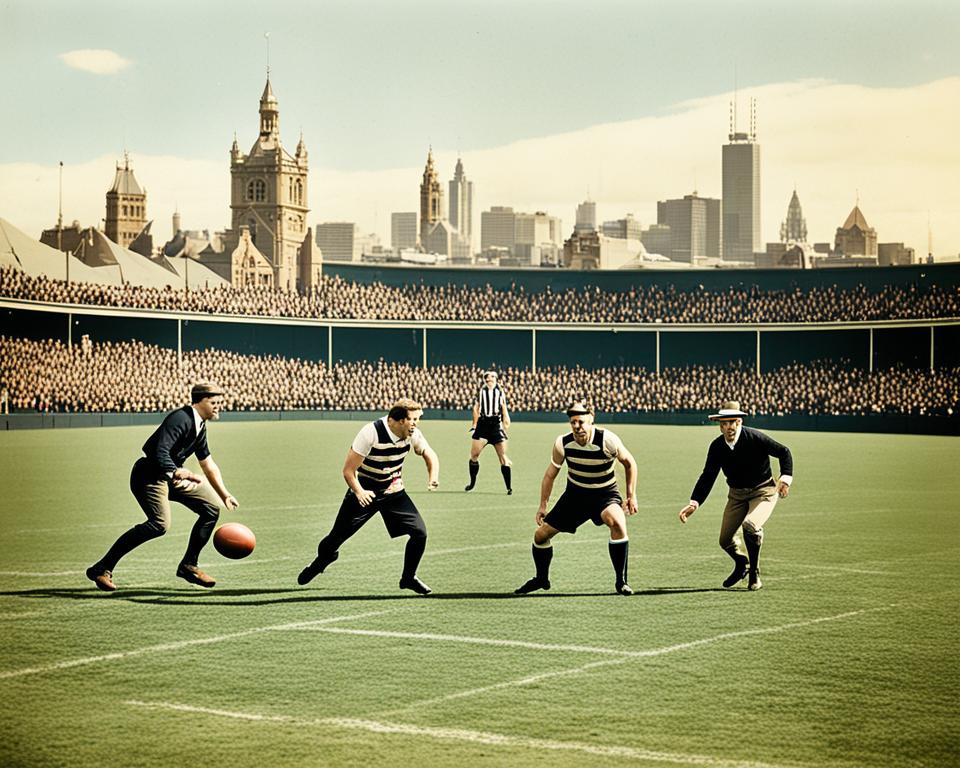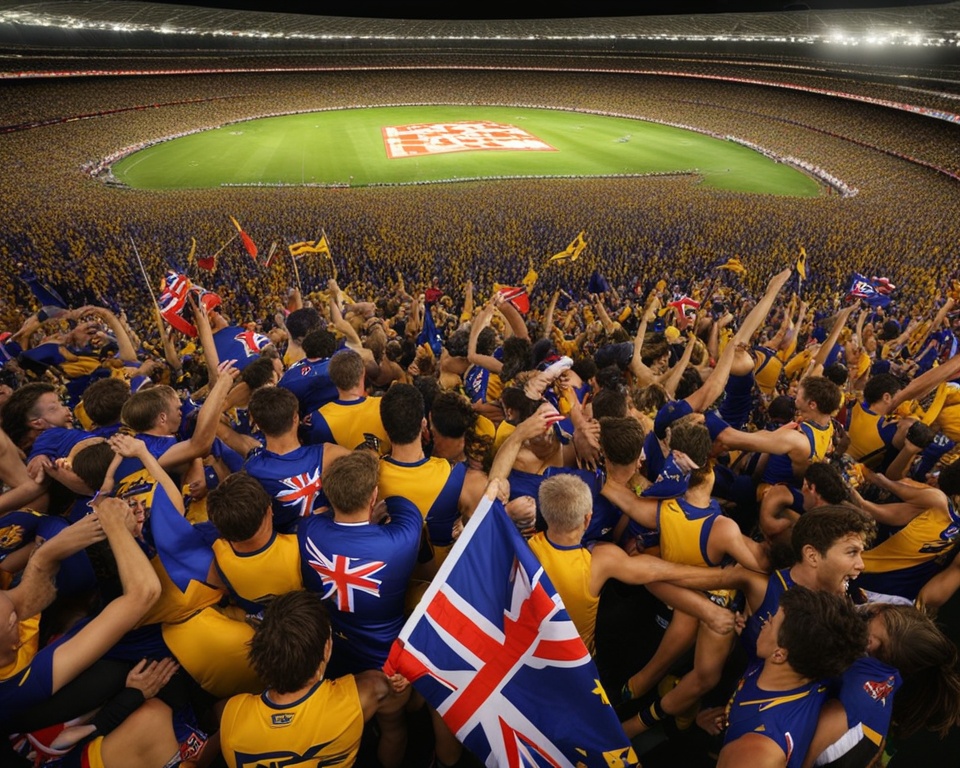The Australian Football League (AFL) is a national men’s professional Australian rules football competition. It is one of the oldest and most popular sports in Australia, with a rich history dating back to the 1850s. The sport has evolved over the years, with the first official match being played in 1858. Since then, it has grown in popularity and become deeply woven into Australian culture.
The AFL Grand Final is the culmination of the league’s season and is one of the biggest and most anticipated sporting events in the country, drawing in massive crowds to the iconic Melbourne Cricket Ground (MCG) every year. Fans passionate about their local AFL teams create an electric atmosphere, making the AFL experience truly thrilling and unique.
Origins and History of Australian Rules Football
The origins of Australian rules football can be traced back to the traditional Aboriginal game of Marngrook, a ball game played by various Indigenous groups in the western regions of Victoria. Johnny Connolly, a Mukjarrawaint man, provided a firsthand account of this traditional game, which involved two teams kicking a ball high into the air and keeping it off the ground. This game is believed to have influenced the development of Australian rules football, as the sport’s early rules, such as the emphasis on keeping the ball in the air, bear similarities to Marngrook. However, the link between Aboriginal Influence on AFL and the codification of the rules of Australian rules football has been a subject of debate among historians, with some arguing that there is insufficient documentary evidence to conclusively prove the connection.
Tom Wills and the Codification of AFL Rules
Despite the ongoing debate, the role of Tom Wills, a prominent figure in the early history of Australian rules football, is widely acknowledged. In 1858, Wills proposed that cricketers should play football as a way to keep fit in the off-season. The following year, Wills founded the Melbourne Football Club and co-wrote the initial rules for the sport, which included elements like not allowing players to be “thrown to the ground” and keeping the ball in the air. Wills, along with his cousin Colden Harrison and J.B. Thompson, actively marketed Australian rules football as a “game of our own,” differentiating it from the rugby-style games played in England at the time. This strategic move helped the sport gain rapid and widespread appeal, transitioning from a pastime of the colonial elite to a sport played and spectated by the colonial masses during the Victorian gold rush era.
The Rapid Growth and Popularity of the Game
Australian rules football swiftly transitioned from a niche sport to a national phenomenon, spreading from Victoria to the colonies of Tasmania, South Australia, and Western Australia. Historian Barry Judd states that the sport’s “distinctly Australian political, social, and economic setting of the time gave it a character that was not English in form or in tempo.” The democratic spirit of the period allowed the sport to become one where personal wealth, class, and educational status mattered little, appealing to the colonial masses. The sport’s rapid growth and widespread appeal can be attributed to its ability to speak to the ideals of equality and the “game of our own” narrative that was promoted by its early advocates.

Exploring the Thrills of AFL in Australia
Attending an AFL match in Australia is a truly thrilling experience that immerses fans in the heart-pounding action of the game. The electric atmosphere at iconic stadiums like the Melbourne Cricket Ground (MCG) creates an unparalleled sense of excitement and passion. Fans dress in their team’s colours, chant and sing their club anthems, and celebrate every mark, goal, and victory with unbridled enthusiasm.
The adrenaline-fueled moments on the field, where players showcase their skill and athleticism, are met with roars from the crowd, creating a palpable energy that envelops the entire stadium. The ritual of attending an AFL match, from pre-game festivities to the final siren, is an integral part of Australian culture and a must-experience for anyone seeking to explore the thrills of this beloved national sport.
| Key Experiences of AFL Matches in Australia | Description |
|---|---|
| Passionate Fans and Atmosphere | Fans dressed in team colours, chanting, singing anthems, and celebrating every play with unbridled enthusiasm, creating an electric atmosphere. |
| Iconic Stadiums | Matches held at legendary venues like the MCG, which can hold over 100,000 spectators and are deeply woven into the fabric of Australian sports culture. |
| Adrenaline-Fueled Action | Watching the skill and athleticism of AFL players, with the crowd roaring in response to every mark, goal, and hard-fought contest. |
| Cultural Immersion | Attending an AFL match is a quintessential Australian experience, with pre-game festivities and the overall ritual forming an integral part of local culture and tradition. |

The Grand Final Spectacle
The AFL Grand Final is the culmination of the Australian Football League’s season-long competition, where the top two teams battle it out for the ultimate prize – the Premiership Cup. This championship game is steeped in tradition, with the event being held at the iconic Melbourne Cricket Ground (MCG) every year since 1902. The finals series leading up to the Grand Final adds an extra layer of excitement and tension, as teams fight to secure their spot in the grand final showdown. The format of the AFL Grand Final is unique, with the top two teams from the regular season qualifying to compete for the coveted Premiership. This annual event has become a significant part of Australian culture, drawing in massive crowds and captivating the nation with its high-stakes, adrenaline-fueled action.
The Format and Tradition of the AFL Grand Final
The AFL Grand Final is the culmination of the Australian Football League’s season-long competition, where the top two teams battle it out for the ultimate prize – the Premiership Cup. This championship game is steeped in tradition, with the event being held at the iconic Melbourne Cricket Ground (MCG) every year since 1902. The finals series leading up to the Grand Final adds an extra layer of excitement and tension, as teams fight to secure their spot in the grand final showdown. The format of the AFL Grand Final is unique, with the top two teams from the regular season qualifying to compete for the coveted Premiership. This annual event has become a significant part of Australian culture, drawing in massive crowds and captivating the nation with its high-stakes, adrenaline-fueled action.
Pre-game Entertainment and Fan Festivities
The AFL Grand Final is not just about the game on the field, but also a day of celebration and festivities for the fans. The pre-game entertainment is a highly anticipated aspect of the event, with some of the biggest names in music and entertainment taking the stage to perform for the packed crowd at the MCG. The atmosphere at the stadium on Grand Final Day is electric, with fans dressed in their team colours and engaged in various fan activities and celebrations. The build-up and anticipation leading up to the game adds to the overall spectacle, making the AFL Grand Final a truly unique and immersive experience for both die-hard fans and casual observers alike.
Fan Culture and Passion
The AFL has a deeply passionate and dedicated fan base, with supporters often forming a strong connection with their local team and the broader AFL community. Attending matches and supporting one’s team is a ritual that brings AFL fans together, fostering a sense of camaraderie and shared identity. Fans often dress in their team’s colours, sing club anthems, and engage in chants and celebrations, creating an electrifying atmosphere that transcends the boundaries of the stadium. This sense of community and belonging extends beyond match day, with AFL fans connecting through social media, local fan groups, and various other platforms. The loyalty and devotion of AFL supporters are a testament to the sport’s ability to bring people together and create a shared cultural experience that is uniquely Australian.
Supporting Your Team and Connecting with the Community
For AFL fans, supporting their team is more than just a pastime – it’s a way of life. Whether it’s cheering from the stands, sharing the highs and lows of the season with fellow supporters, or engaging in lively debates about the latest trades and tactics, the connection between fans and their club is palpable. This sense of community extends beyond the stadium, with fans coming together through social media, local fan clubs, and other platforms to celebrate their shared passion for the sport. The AFL’s ability to foster these deep, meaningful connections is a testament to its enduring appeal and the unwavering loyalty of its supporters.
Learning the Lingo and Becoming a True Aficionado
Becoming a true AFL aficionado involves immersing oneself in the sport’s rich history, traditions, and unique language. Fans often take pride in learning the intricate rules of the game, familiarising themselves with player names, positions, and strategies. Mastering the sport’s lingo, such as terms like “mark,” “tackle,” and “kick,” allows AFL fans to engage more deeply with the action on the field and connect with the broader AFL community. This process of learning and understanding the nuances of the game is an integral part of the fan experience, and can deepen one’s appreciation and enjoyment of the sport. Whether it’s discussing the latest trades and team tactics or debating controversial umpiring decisions, being fluent in the language of AFL is a badge of honour for dedicated fans.
Iconic AFL Stadiums and Match Day Experiences
The Australian Football League (AFL) is deeply rooted in several iconic stadiums across the country, with the Melbourne Cricket Ground (MCG) being the most renowned. Since 1902, the MCG has proudly hosted the prestigious AFL Grand Final, cementing its status as the spiritual home of the sport. The sheer size and electrifying atmosphere of the MCG, with a capacity of over 100,000 spectators, create an unparalleled match day experience for devoted AFL fans.
Other noteworthy AFL stadiums include the Adelaide Oval, the Gabba in Brisbane, and Optus Stadium in Perth, each with their own unique traditions and passionate fan cultures. Attending an AFL match at these iconic venues is a truly immersive experience, where pre-game festivities, dedicated fan bases, and the thrill of the game itself all combine to create an unforgettable day for sports enthusiasts. The rituals and traditions that have developed around these stadiums are an integral part of the AFL’s rich history and the fan experience.
From the roar of the crowd at the MCG during the AFL Grand Final to the unique game-day traditions of each stadium, the iconic AFL venues across Australia offer a truly remarkable and unforgettable experience for both die-hard fans and casual observers alike. These stadiums have become sacred grounds, where the sport’s rich history, traditions, and the unwavering passion of the fans all converge to create an atmosphere that is uniquely Australian.
FAQ
What is the Australian Football League (AFL)?
The Australian Football League (AFL) is a national men’s professional Australian rules football competition. It is one of the oldest and most popular sports in Australia, with a rich history dating back to the 1850s.
What is the history and origins of Australian rules football?
The origins of Australian rules football can be traced back to the traditional Aboriginal game of Marngrook, a ball game played by various Indigenous groups in the western regions of Victoria. The sport’s early rules, such as the emphasis on keeping the ball in the air, bear similarities to Marngrook. Tom Wills, a prominent figure in the early history of Australian rules football, proposed the game in 1858 and co-wrote the initial rules, helping the sport gain rapid and widespread appeal.
What is the atmosphere like at an AFL match in Australia?
Attending an AFL match in Australia is a truly thrilling experience that immerses fans in the heart-pounding action of the game. The electric atmosphere at iconic stadiums like the MCG creates an unparalleled sense of excitement and passion, with fans dressing in team colours, chanting, and celebrating every moment of the game with unbridled enthusiasm.
What is the significance of the AFL Grand Final?
The AFL Grand Final is the culmination of the Australian Football League’s season-long competition, where the top two teams battle it out for the ultimate prize – the Premiership Cup. This championship game is steeped in tradition, with the event being held at the iconic Melbourne Cricket Ground (MCG) every year since 1902. The pre-game entertainment and fan festivities add to the overall spectacle, making the AFL Grand Final a truly unique and immersive experience.
How do AFL fans connect with their teams and the broader community?
The AFL has a deeply passionate and dedicated fan base, with supporters often forming a strong connection with their local team and the broader AFL community. Attending matches and supporting one’s team is a ritual that brings fans together, fostering a sense of camaraderie and shared identity. Fans often dress in team colours, sing club anthems, and engage in chants and celebrations, creating an electrifying atmosphere that transcends the boundaries of the stadium.
What are some of the iconic AFL stadiums and their significance?
The Australian Football League is closely tied to several iconic stadiums across the country, with the Melbourne Cricket Ground (MCG) being the most renowned. The MCG has hosted the AFL Grand Final every year since 1902, cementing its status as the spiritual home of the sport. Other notable AFL stadiums include the Adelaide Oval, the Gabba in Brisbane, and Optus Stadium in Perth, each with their own unique traditions and fan cultures.










